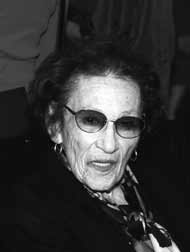The Incredible Maxine Greene
By Scott Noppe-Brandon
Over 30 years ago,
Lincoln Center Institute, through its founder Mark Schubart,
began a critical re-examination of its performing arts program
for young people. The main recommendation of the study, entitled “The Hunting of the Squiggle,” was
for the creation of a new kind of arts organization, one established
just for youth. Heralded by the then NY State Commissioner
of Education, Ewald B. Nyquist, the organization would strive
to bring together artists, teachers, community agency leaders,
parents, and students to establish an interdisciplinary collaboration
directed at bringing the arts into the everyday lives of students.
The recommendation, based on the evaluation of over 200 education
programs by arts organizations in the country, was considered
vibrant and visionary, so much so that the report of it earned
front page coverage in the New York Times. I have often joked
that the only way to get that kind of coverage today would
be to enact a ritual sacrifice of a teacher each summer.
 |
Maxine
Greene |
Upon Mark’s retirement
from Lincoln Center, he bestowed upon me a prized possession,
a letter from a ninth grade student, commenting on a dance
performance that had just occurred at his school. It reads:
Dear Performers,
Thank you for performing at my high school on Friday.
I liked it a little.
Sincerely,
John
From the “Squiggle” study, a new organization
at Lincoln Center was developed. An institute was formed; a
place of study and place of practice about the arts and about
education. Mark knew that in order to develop this new type
of art-and-education organization, he needed help. He imagined
that the type of help needed was within the education theory,
the educational philosophy part of the experience. Once again,
he set about looking for something—or someone—new.
As luck would have it, he was put in touch with Lawrence Cremin,
then President of Teachers College, Columbia University. President
Cremin knew the perfect person, a distinguished Philosopher
of Education, Dr. Maxine Greene. A marriage of minds and temperaments
followed and Dr. Greene became the Philosopher-in-Residence
at the newly founded Lincoln Center Institute (LCI). Known
to everyone as Maxine, she has for more than 30 years been
the philosophical voice, the educational wellspring of LCI.
Next summer, as part of the LCI 30th Anniversary celebration,
we will honor our dear friend and colleague.
The best way to honor
Maxine is to continue to actively pursue the depth and breadth
of her educational vision. As part of this, with enthusiastic
support of its wonderful teaching artists, program, artistic
and administrative staff, LCI is once again undertaking a
critical re-examination. One dramatic outcome of this effort
is the creation of a new high school, named the High School
for Arts, Imagination and Inquiry, which will open its doors
this September. Housed in the Martin Luther King, Jr. campus
across the street from Lincoln Center, this school will have
a connection to Maxine like no other. Initially, LCI conceived
of the school as a place to honor Maxine. Maxine drafted
the original concept paper for the school. She was part of
the interview process to hire the Interim Acting Principal,
Stephen Noonan. She helped present the concept of the school
for approval to the NYC Department of Education and New Visions
for Public Schools. And she continues to meet with Madeleine
Holzer, LCI’s Director of Education Development, Stephen,
and the teachers as the development of the school takes shape.
Finally, Maxine plans to be available to students and teachers
throughout the school year. She will even have office hours.
Amazing, yes; atypical, of course not: it’s Maxine.#
Scott Noppe-Brandon is the Executive Director of the Lincoln
Center Institute for the Arts in Education. www.lcinstitute.org
